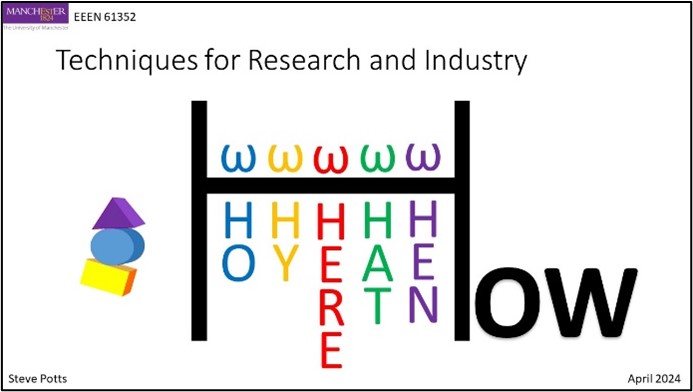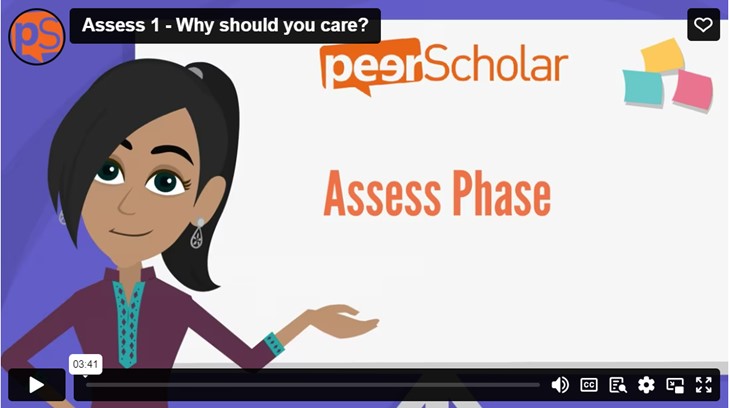Developing students as innovators

Background
The University of Manchester is celebrating “200 years of making a difference” [1]. That difference can be attributed to research, innovation, and teaching. According to Professor Richard Jones, “Research is turning money into ideas. Innovation is turning ideas into money” [2].
Promoting innovation, the Organisation for Economic Co-operation and Development (OECD) is an international organisation that works to build better policies for better lives [3]. In support of delivering that, it promotes innovative working practices using various media to deliver its messages. Through a recent podcast the OECD asked “How can we turn students into innovators? Responding to that question, Geoff Mulgan, CEO of the UK’s innovation agency for social good (Nesta UK) [4] asserts that: “The way most students are taught today most of the time is as individuals in classrooms absorbing learning in pedagogy which is not that different from a hundred/hundred-and-fifty years ago – it’s almost the opposite of how innovation is done which is usually with others, in a team, which is usually not just absorbing pre-existing knowledge (which helps) but it’s trying to discover something new to try to solve some new kind of problem, and it allows you to speculate, to take risks, sometimes to fail, to do things differently.” [5].
Techniques for Research and Industry provides MSc students at the University of Manchester with a conducive experiential learning opportunity. It involves working creatively in a team to make new discoveries and solve new problems, to speculate, to take risks and benefit from there consequences (good or bad), to develop key professional skills, to differentiate themselves, and to succeed in post-student ventures.

Who?
Steve Potts joined the University with a rich background in engineering and management, a history of recruiting graduate and postgraduate candidates into industry, and a desire to build on his experience to help equip students to become professional engineers of the future. Steve believes that critical review and constructive feedback are key contributors.
Why?
As well as the ability to prepare and deliver convincing reports and presentations, Steve considers the ability to engage in critical review and to deliver constructive feedback to be vital skills underpinning engineering advancement and technical innovation. These are skills he is committed to develop.
Where?
MSc students studying EEEN61352 (Techniques for Research and Industry) led by Steve Potts within the Department of Electrical and Electronic Engineering at the University of Manchester enjoy direct exposure to the connectivity between the University’s key activities of teaching, research, and innovation. Studying the unit helps MSc engineering students to equip themselves for a creative professional engineering future.
What?
Seeking to introduce experiential learning to develop critical review skills and improve constructive feedback into taught materials Steve was interested to learn that Rebecca Riley form the e-Learning Team at the University of Manchester was evaluating tools to support the pedagogy. Having also been invited to contribute to a Peer Active Learning (PAL) program led by James Brooks to improve feedback in the learning process, it seemed a logical step to try exploit all in combination.
When?
The culmination of the activities was deployment of a scholarly tool to facilitate critical constructive feedback through peer-review and peer-assessment of coursework on the EEEN61352 ‘Techniques for Research and Industry’ unit delivered to a combined cohort of EPSE (Electrical Power Systems Engineering) and REaCT (Renewable Energy and Clean Technology) MSc students.
How?
Within a remit to develop key professional skills, new materials have been introduced to expose students to the process of peer-review and the benefits of giving and receiving constructive feedback. Positively influencing the design and deployment of new materials were the two Faculty-led development activities:
- Peer Action Learning (PAL)
- peerScholar [6] Pilot project
Peer Action Learning
Peer Action Learning is a collaborative enhancement programme where a group of academics with a common need, in this case improving feedback to students, work together with student reps a learning technologist and an academic facilitator for nine months to learn about, plan, implement and reflect on an improvement to their course. PAL participation provided the opportunity to work alongside the student reps and colleagues from different disciplines to enhance the feedback given to students.
peerScholar Pilot project
peerScholar is a peer evaluation tool, where students can submit work, access, and evaluate peer work (using a pre-defined rubric) and reflect on the feedback they have received [6]. The course team wanted to provide a low stakes opportunity for students to practice delivering a presentation in a live session on campus, gain feedback and be able to improve their work for the final assessment.
The peerScholar pilot offered:
- An opportunity for eLearning to test the effectiveness of the tool on a ‘live’ project.
- For the course team to use a tool which would facilitate peer learning as part of the redesigned course unit.
peerScholar scaffolds student learning, by including short videos on:
- Why learning to give effective feedback is a valuable skills
- Why giving effective feedback is challenging
- Characteristics of constructive feedback
Students are encouraged to watch these videos before completing the peer evaluation.

Impact
Within the context of EEEN61352, the introduction of peer-review has been well-received. As well as delivering against the intended learning outcomes, it brought enjoyment both to the students and to the teaching delivery team. Testaments delivered in feedback through the unit evaluation included:
- “The unit itself is an excellent attempt to prepare me as an engineer for the industry”.
- “It builds other skills that are not technical and are crucial to success on a future professional environment”.
- “Really interesting unit and a good opportunity to familiarise students with various aspects such as technical research, giving presentations in a low risk environment, finding out how you can improve and giving constructive feedback”.
A particularly significant takeaway from the PAL exercise included improved understanding of the context and language of the student voice, enabling the communication of feedback to be adjusted to optimise student reception. This benefits the process of reflecting achievement against targets and providing constructive direction to steer student learning improvements.
Peer evaluation can be a valuable activity to aid students learning, so it is useful to have tools such as peerScholar which can support this type of activity.
Potential benefits of using a peer evaluation tool include:
- Automating some processes, such as allocating students to reviews, collating feedback and averaging grades.
- Enabling large cohorts to use peer evaluation by reducing administrative workload.
One factor to consider if using a tool like peerScholar is whether you want students to complete feedback as part of a synchronous or asynchronous activity. For example, in the unit described, the peer evaluation tool is completed in live presentation session. Using peerScholar in a live session allows students to capture immediate thoughts and feedback. However, using the tool in this way also divides attention between the student presenting and task of writing feedback. Overall, the majority of students were able to successfully complete the activity in peerScholar.
Students benefitted from the opportunity to:
- Practice their presentations and gain valuable peer feedback (automatically collated by peerScholar).
- Practice giving constructive feedback and reflective skills by considering what they could improve for their final submission.
References
- [1] Talk 200: lecture and podcast series | The University of Manchester
- [2] Talking innovation: It’s in Manchester’s DNA (youtube.com), Professor Richard Jones, Professor of Materials Physics and Innovation Policy and Vice-President for Regional Innovation and Civic Engagement. Accessed 23/5/24.
- [3] About the OECD – OECD. Accessed 23/5/24.
- [4] Nesta | UK innovation agency for social good. Accessed 23/5/24.
- [5] How can we turn students into innovators? by Top Class, The OECD education podcast (soundcloud.com) (6m10s). Geoff Mulgan, CEO Nesta UK. Accessed 23/5/24.
- [6] peerScholar home (the home page for peerScholar). Accessed 4/6/24.


